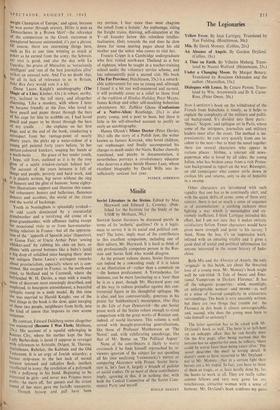Minilit
SHOULD Soviet literature be discussed purely in terms of • its `esthetic' qualities? Or is it legiti- mate to survey it in its social and political con- text? The latter, imply most of the contributors to this excellent symposium, including one of their editors, Mr. Hayward. It is hard to think of any professionally competent person in the Rus- sian and Soviet field who would disagree.
As the present volume shows, Soviet literature can indeed be a rewarding study if it is taken as an illustration of—rather than a comment on —the human predicament. A Yevtushenko, for instance, can be more fascinating as a `case' than he is as a poet, though Mr. Hayward goes out of his way to redress prejudice against this con- troversial figure in his thoughtful epilogue. He is also, and less controversially, generous in his praise for Solzhenitsyn's masterpiece, One Day in the Life of Ivan Denisovich—the one Soviet prose work of the Sixties robust enough to stand comparison with the great works of Russian and, indeed, of world literature. This volume is well served with thought-provoking generalisations, like those of Professor Matthewson, on `The Novel,' and, with exhilarating anecdotage, like that of Mr. Benno on `The Political Aspect.'
None of the contributors is likely to worry overmuch if he finds himself reproached by re- viewers ignorant of the subject for not spending all his time analysing Voznesensky's metres or comparing Aksyonov with Proust. Soviet litera- ture is, let's face it, largely a branch of politics or social studies. Or so most of these contributors imply, agreeing in this, if in nothing else, with both the Central Committee of the Soviet Com-
munist Party and myself. RONALD HINGLEY






























 Previous page
Previous page